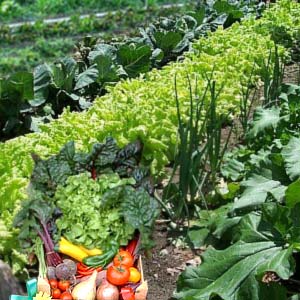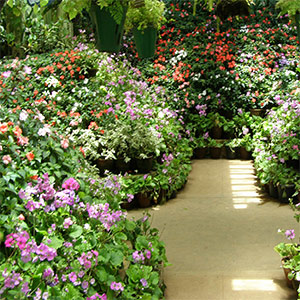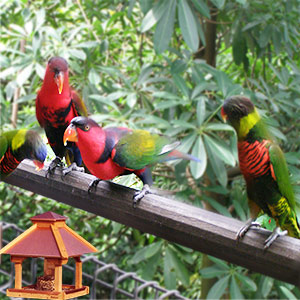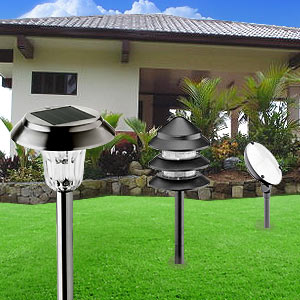Organic Gardening

Growing plants in the most natural way by equating your plant to nature is organic gardening. Harness the eco-system to grow plants organically. People who grow plants organically work hand in hand with nature and incessantly restore the resources that are consumed by the garden.
Understanding organic gardening
Organic gardening is a method of growing plants without the use of pesticides and synthetic fertilizers. Organic matter from locally obtainable resources is frequently added to the soil thereby replenishing the soil. Organic matter used for the plants is easily available in every household as it is produced from the kitchens, lawns and garden waste. Vegetable scraps thrown from the kitchen, fallen leaves, grass clippings etc are used as the building blocks for compost.
Organic gardening improves the soil's ability to reproduce continuously. The soil is replenished by adding compost and rotating crops. Compost provides mineral nutrients to the soil and crop rotation prevents only few nutrients from being used repetitively. Chemicals are not used in organic gardening as it harms the beneficial insects that help in organic gardening.
Golden rules of organic gardening
The term organic gardening might sound complicated for many but in reality it is very easy to grow plants the organic way. Follow these simple rules to begin growing plants the organic way:
Start with the soil: Make the soil suitable for the type of plants you wish to grow. Use organic material to amend your soil.
Mulch: This helps to reduce weeds, saves a lot of water and nourishes the soil.
Pick the right plants: Choose plants of a varied variety, this will limit pests. Also choose plants that suit your growing conditions, soil and weather. Plants you choose should be able to tolerate pests to some extent. You can also choose plants that attract plant-friendly insects towards them.
Be prepared for pests: A small amount of pest attack is bound to happen in any crop. If you feel the pests have just started, give nature the chance to take over. Natural predators can fix the problem in a better manner than we do. Intervene only if the pests' menace is out of control.
Choose the right pest control: Do not use harsh pesticides and insecticides on your plants as this is totally against organic gardening. Try and prevent pests from occurring rather than using chemicals. Few plants like marigold have an in-built ability to stop pests - try growing pest resistant plants in your organic garden. Resort to chemical pesticides as the last option.
Use natural fertilizers: Try and use homemade fertilizers as chemical fertilizers can rob your soil off its micro nutrients. Kitchen scraps and yard wastes are the best fertilizers for organic gardens.
Water your plants rightly: Never water the plants when they don't need to be. Water them only when required, sprinklers are the best choice to water plants. Water dependent plants should be planted in the wet parts of the garden and plants that require less water should be grown in arid parts of the garden.
Introduce good insects: Ladybugs, wasps, dragonflies, parasitic nematodes,and few other useful insects eat the harmful insects thus acting as natural insecticides. Introduce these insects to your organic gardens.
Organic gardening requirements
Organic soil and soil amendments: For organic gardening, choose soil that is free from chemical fertilizers and pesticides. The soil should be natural and healthy. You can continue organic way of gardening even though chemical fertilizers and pesticides had been used previously at the site you have chosen for organic gardening. The chemicals and pesticides will wear off slowly.
Organic garden seeds: For organic gardening, organic seeds are used to grow plants. Organic seeds are available to grow both vegetables and herbs.
Organic garden fertilizers: Fertilizers for organic gardening should be made up of natural ingredients. Ensure you buy a fertilizer bearing 'certified organic' label. Common organic fertilizers are
- Compost: Natural fertilizer and soil amendment
- Epsom salt: Provides sulfur and magnesium to soil, improves flower growth
- Compost tea: Replacement for chemical liquid fertilizers, used mainly in home gardens
- Manure: Rich in plant nutrients
- Fish emulsion: Rich in nutrients
- Cover crops: After gardening is complete for the season, other annual crops and rye grass are grown to replenish nitrogen and other minerals in the soil
- Seaweed fertilizer: Contains amino acids and many more nutrients essential for plant growth
- Worm casting: Worms consume plant matter and expel soil additives that are mineral rich
- Seaweed and kelp: Supplies nutrients and small amount of minerals, enhances growth of the root
- Fish fertilizer: Has high levels of micro nutrients, nutrients and minerals.
Organic insect repellents:
Insects have to be kept at bay in any method of gardening. For organic gardening the below mentioned are the famous insect control methods:
- Insect repellents:
Organic insect repellents have a garlic base and they resist insects but do not kill them. After rainy season, organic insect repellents have to be used more frequently.
- Beneficial insects:
Beneficial insects like lady bugs help the plants in an organic garden.
- Companion plants:
Companion plants can be plants like onions and garlic that wade off insects. Marigolds can also be used as companion plants.
- Barricade for insects:
Insects can be blocked by using fine nets. These nets can be used to block insects living above the ground but cannot block insects from within the soil.
Tips for organic gardening
- Choose plants that will grow well in the climate and environment that you provide.
- Provide healthy soil for your plants to grow. Use microbes, soil microorganisms to boost general soil health.
- Use companion plants in your organic garden; this improves the yield by keeping insects away and also replenishes the nutrient supply to the main plantation.
- Water your organic garden in the morning, this helps in keeping away fungal diseases in plants that occurs because of high humidity.
- A plant with thick leaves require less water and a plant with thin leaves require more water.
- Introduce beneficial insects in your organic garden.
- Earthworms are good for the soil; they aerate the soil thus improving plant growth.
- Sprouted seeds that are used for organic gardening should be kept moist by watering it frequently else they will dry up.
- Practice crop rotation year after year, this improves the yield of crops and also improves the soil health.
- New soil beds require more compost and soil amendments than old soil beds.
Top of the Page: Organic Gardening
Tags:#organic gardening

Eco Friendly Homes
Garden Maintenance
Organic Gardening
Vegetable Garden Layout
Xeriscaping
Hydroponics Gardening
Feng Shui Garden
Ornamental Plant
Container Garden
Growing Succulents Indoors
Landscape Design Idea
Herb Garden Design
Window Garden
Lawn Mowing
Lawn Maintenance Tips
Orchid Care
Bonsai Tree
Cactus Plant
Thanksgiving Cactus
Rock Garden
Gardening Accessories

Bird Feeder
Leaf Blower
Solar Bird Bath
Lawn Sprinkler System
Outdoor Garden Furniture
Garden Fountain
Butterfly Garden
Electric Lawn Mower
Garden Pond
Landscaping

Landscaping
Landscape Lighting
Outdoor Canopy
Solar Garden Lights
Garage Plan
Home Improvement
Home Furnishing
Home Improvement Catalog
Feng Shui
Top of the Page: Organic Gardening
Popularity Index: 101,410

